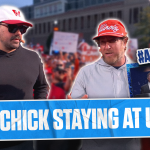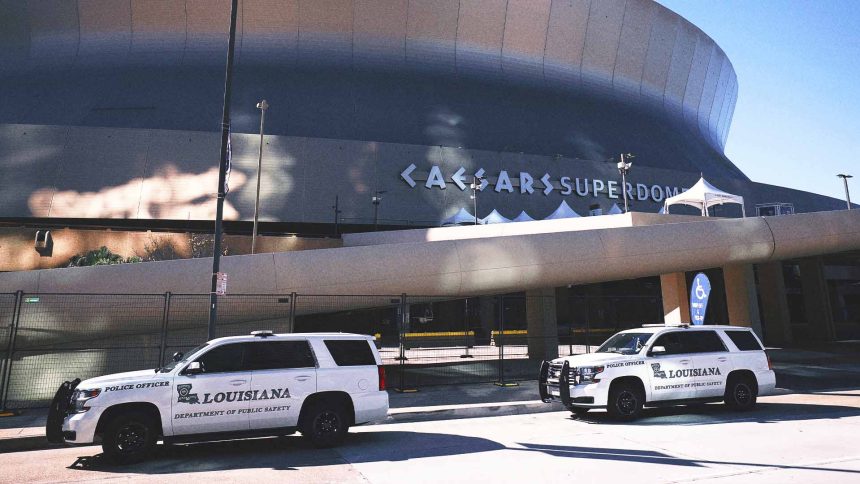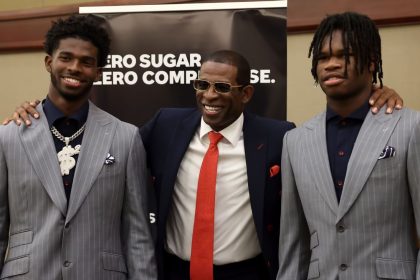The College Football Playoff quarterfinal at the Sugar Bowl between Georgia and Notre Dame was postponed a day because of an attack about a mile away from the Superdome early Wednesday, when a truck plowed into a New Year’s crowd and killed at least 15 people.
The game, originally scheduled for 7:45 p.m. Central at the 70,000-seat Superdome, was pushed back to 3 p.m. Thursday. The winner advances to the Jan. 9 Orange Bowl against Penn State.
“Public safety is paramount,” Sugar Bowl CEO Jeff Hundley said at a media briefing alongside federal, state and local officials, including Louisiana Gov. Jeff Landry and New Orleans Mayor LaToya Cantrell. “All parties all agree that it’s in the best interest of everybody and public safety that we postpone the game.”
U.S. Rep. Troy Carter said the decision to postpone the game “was not done lightly.”
ADVERTISEMENT
“It was done with one single thing in mind: public safety — making sure that the citizens and visitors of this great city, not only for this event, but for every event you come to in Louisiana, that you will be safe,” Carter added. “And we will use every resource possible.”
Landry said he had a message for those thinking, “Man, do I really want to go to the Sugar Bowl tomorrow?”
“I tell you one thing: Your governor’s going to be there,” Landry said. “That is proof, believe you me, that that facility and this city is safer today than it was yesterday.”
Hundley said work was underway to “set up a safe and efficient and fun environment” at and around the Superdome on Thursday night. “We live in the fun-and-games world with what we do, but we certainly recognize the importance of this and support (public safety efforts) 100%.”
The Superdome was on lockdown for security sweeps on Wednesday morning, when people with offices in the Superdome — including officials with the Sugar Bowl and Sun Belt Conference — were told not to come into work until further notice.
Some credentialed Superdome employees were permitted into offices by Wednesday afternoon.
The casualties occurred when a driver rammed a pickup truck into a crowd of revelers in New Orleans’ famed French Quarter early on New Year’s Day, injuring more than 30 people. The driver was killed in a firefight with police following the attack at about 3:15 a.m. along Bourbon Street near Canal Street, the FBI said.
Among the victims was former Princeton football player Tiger Bech, according to a report by ESPN on Wednesday. Bech was an All-Ivy League kick returner who also caught 53 passes for 825 yards in three seasons (2017-19) at Princeton.
Jack Bech, Tiger’s brother and a former TCU receiver, posted on X: “Love you always brother ! You inspired me everyday now you get to be with me in every moment. I got this family T, don’t worry. This is for us.”
The Georgia and Notre Dame football teams arrived in New Orleans on Sunday and have been staying at downtown hotels just blocks away from where the violence occurred.
Statements from the University of Georgia Athletic Association and from Notre Dame said both schools had accounted for all team personnel and members of official travel parties.
“To be in solidarity with those who suffer is to exemplify the spirit of Notre Dame,” said university president the Rev. Robert A. Dowd. “Today, we are in solidarity with all those impacted by this tragedy.”
A statement from Georgia athletic director Josh Brooks offered prayers for “everyone involved in this horrific event, and we are here to support them in any way possible.”
Georgia president Jere Morehead said the university confirmed that a student was among those critically injured. Morehead said the university is in contact with the student’s family to offer support.
New Orleans City Council President Helena Moreno told WDSU-TV earlier Wednesday, before the postponement was announced, that the security perimeter around the Superdome was being “extended to be a larger zone.”
“So expect obviously extra security,” she said. “There are more police officers who are coming in.”
The Superdome, which is about 20 blocks away, also is scheduled to host the Super Bowl on Feb. 9.
The first Super Bowl after the terrorist attacks of Sept. 11, 2001, also was held in New Orleans, and there was a massive security perimeter for that game including street closures surrounding the Superdome and officers — including snipers — on the tops of surrounding high-rise buildings, as well as on the roof of the dome itself.
“We are deeply saddened by the news of the devastating incident in New Orleans,” the NFL said in a statement. “The NFL and the local host committee have been working collaboratively with local, state and federal agencies the past two years and have developed comprehensive security plans.
“These planning sessions will continue as they do with all major NFL events,” the statement continued. “We are confident attendees will have a safe and enjoyable Super Bowl experience.”
Reporting by The Associated Press.
recommended

Get more from College Football Follow your favorites to get information about games, news and more










